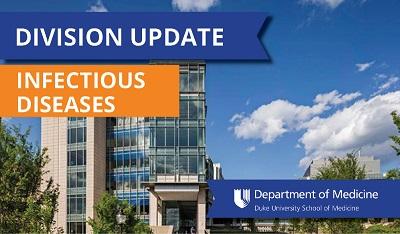Infectious Diseases Division Update with Chief John R. Perfect

The Infectious Diseases Division has been very busy over the last couple of years and COVID has made a substantial impact on us. We, as a division, have been blessed with the responsibility to care for those with infections and have now lived through two major recent infectious disease outbreaks-- AIDS and COVID-19. We hope the shift in the last few months allows us to see a manageable level of clinical practice as COVID has become a more chronic, stable occurrence in the health system.
People
For the Infectious Diseases Division, it is important for me to make a very big “shout out” for the over 60 faculty, 14-15 fellows and 7 PA’s and nurse clinicians who have been at the front line of critical care and research during this pandemic and similarly, the more than 40 personnel in Infectious Diseases who support them. My “praises and thank yous” cannot completely capture how much they have meant during these recent crises.
As with the AIDS epidemic, COVID will not rapidly go away and we will be left with persistence of transmission and chronic sequelae. Meanwhile, the Infectious Disease Division will by necessity be involved in the Post-COVID era. We care for patients with serious diseases and compromised immune systems and infections are woven into the clinical and research fabric at this medical center.
Milestones
As I write this first review of the Infectious Diseases Division, I want to emphasize the magnitude of our care, research and education mission.
We have ten clinical services:
- 4-Transplant ID Services;
- 5- General ID Services at Duke, and
- 1-VA ID Service
Additionally, we have two services at Duke Regional Hospital. With these clinical responsibilities we attend to more primary consults per week than any specialty or general services at Duke. We continue to publish over 200 manuscripts per year with a research grant portfolio which includes National Institutes of Health, Department of Defense, and private industry.
Clinical Focus
We are proud of the expanded care we’re able to provide both locally and globally to include:
- DICON/DASON- series of hospitals where we coordinate and manage Infection Control and Antibiotic Stewardship;
- a robust Transplant Infectious Disease Network;
- basic science laboratories working with bacteria, virus, fungi and parasites;
- International network of collaborations throughout the world and specifically, Tanzania, Kenya, Singapore, and Vietnam; and
- 2200 patient HIV clinic network for care and research.
We have specialty clinics to care for infections with left ventricular assist devices (LVAD); hematological malignancies and (CART-T therapy); organ transplants; and a Travel Clinic.
Research Focus
The ID Division has several research foci including:
- Members in the Duke University Mycology Research Unit (DUMRU),
- HIV Center of Excellence;
- Clinics in Bone/Joint Infections;
- Partnerships with DGHI in the arena of Global Health;
- Transplant Network;
- Members in the CHoMI (bacteria) Supergroup;
- Duke-specific Infection Control and Antibiotic Stewardship leadership roles;
- Hubert-Yeargen Center in Global Health.
In each of these areas we have specific expertise and directions.
The Call
Infections will continue to play an important part of our lives at Duke. We, in Infectious Diseases, are here to meet the challenge of understanding, preventing and treating Infectious Diseases. From the healthy to the sick, infections and their consequences cross our medical pathways and we must always be ready to meet their challenges. For instance, we believe over the last 2-3 years there has been a specific “call to arms”. We, in Duke Infectious Diseases, are ready from clinical care, research and educational aspects to respond daily to that “call”.